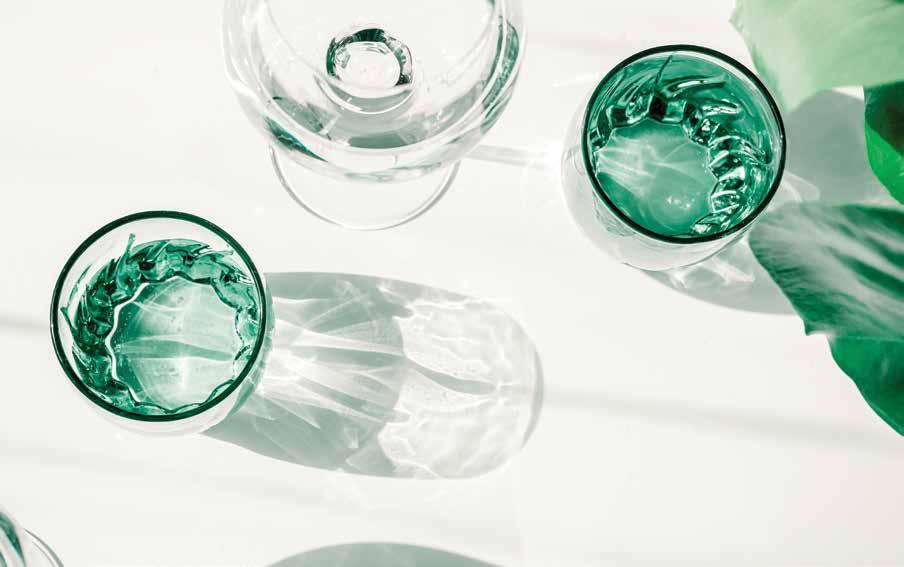
5 minute read
Drink Up! The Importance of Staying Hydrated
DRINK UP!
The Importance of Staying Hydrated
BY JULIE PRESCOTT
We all know we need water to survive. After all, 72% of our world is water, plants are up to 95% water, and our bodies are, on average, 60% water. Without it, life would not exist.
Replenishing the water we lose every day through perspiration, respiration (breathing), urine, and bowel movements is critical.
We need to stay hydrated to ensure every cell, tissue, and organ in our body works properly, for many functions:
• Digest food and flush out waste • Deliver oxygen throughout the body • Regulate body temperature, heart rate, and blood pressure • Lubricate and cushion joints • Protect the spinal cord and other sensitive tissues, and for cellular function
• Optimize brain function • Maintain energy
Are You Dehydrated?
Dehydration is the condition in which the body’s loss of water exceeds its water intake.
As little as one or two percent water loss in your body can trigger dehydration. Here are the signs of mild to severe dehydration.
DID YOU KNOW?
A person can only survive three or four days without water.
In babies and toddlers:
• A dry diaper for three or more hours • No-tears crying • Atypical sleepiness or drowsiness • Fussiness
• Dry mouth • High fever
In adults:
• Rough/flaky/red, tightening, or shrinking skin; cracked lips • Dry or sticky mouth and tongue, and bad breath
• Constipation, less frequent urination, or dark yellow to amber urine • Thirst and hunger • Low blood pressure • Fatigue, lethargy, or headache • Nausea, dizziness, or vomiting • Feeling lightheaded, or fainting
• Rapid heartbeat and breathing • Lack of alertness, focus, concentration, vision, and memory; slower reaction time • Increased pain sensitivity • Lower mood, confusion, or irritability
How Much is Enough?
We’ve all heard about the general guideline of eight glasses of water a day, but everyone’s needs are different. A lot depends on your:
• Age, body size, shape, and balance of muscle and fat; • Activity level: how much you sit, stand, or exercise; • Diet: you’ll need more water if you eat salty and spicy foods, or drink caffeinated or sugary beverages rather than fresh fruit and vegetables that are high in water; • Environment: temperature and humidity levels; and • General health: if you have heart or kidney issues, an infection or fever, vomiting or diarrhea, or are on medication, or if you are pregnant or breastfeeding.
The best way to know if you’ve had enough water is to pay attention to your body.
You are dehydrated if you feel thirsty or if your urine is a dark yellow rather than a clear, pale yellow.
Check with your doctor or dietitian—especially if you have kidney or heart problems—if you are concerned or need help to determine the amount of water that’s right for you.
Too Much of a Good Thing
Although rare, too much water can be dangerous. The amount of sodium in your blood becomes diluted when your kidneys can’t get rid of the excess water, which causes a potentially life-threatening condition called hyponatremia. Athletes who run marathons or exercise intensely benefit from beverages that contain electrolytes and a little sugar. Plain water is just fine for moderate exercise.

Symptoms of mild dehydration
Impaired concentration and mood
Increased headache frequency
Affected fatigue levels, focus, reaction speed, and short-term memory
Reduced muscle strength, power, and endurance
A BODY OF WATER
Different parts of the body have different percentages of water. The brain and kidneys (80–85%) have the highest percentage, while bones (20–25%) and teeth (8–10%) have the least. Your skin is 70–75% water. Lean muscle has more water than fatty tissue. Women typically have a lower percentage of water than men. Water percentages change as we age. Babies have a very high percentage of water in their bodies, older adults less.
With warmer weather comes more outdoor activities. Here are a few simple strategies to make sure you stay hydrated effortlessly. • Keep water handy and sip, sip, sip throughout the day. • Keep a glass of water by your bed and drink it first thing in the morning. • Carry a refillable water bottle in your bag, on your bike, and in your car. • Place a jug of water on your desk to easily refill your glass. • Choose water with your meals. • Drink a glass of water before and after exercise—and during, if the activity is intense. • Drink a full glass of water with your medication.
Drinking water isn’t the only way to stay hydrated. About 20% of our daily fluid needs can come from our food. Remember, foods like watermelon, lettuce, and spinach are almost 100% water by weight.
Limit beverages with caffeine, sugar, sodium, and saturated fat—like sodas and energy drinks, commercial vegetable juices, specialty coffees, teas, and hot chocolate. Straight water is your best option.
TIP
Don’t wait until you feel thirsty to drink. Stay hydrated by constantly sipping water during the day.
The Flavours of Summer
Crush, tear, chop, or squeeze to release a boost of flavour and nutrition into plain or carbonated water. Try flavours on their own or in mix ‘n match combinations like these:
• Strawberries and basil
• Raspberries or blueberries and mint • Cucumber and lemon balm
• Apple or pear and a cinnamon stick • Lemon and ginger • Watermelon and mint
• Grapefruit and rosemary
QUIZ
How hydrated are you?
Skin
Gently pinch the skin on your arm or stomach with two fingers so that it makes a “tent” shape, then let the skin go. The skin should spring back to its normal position in one to three seconds. If it takes longer, you might be dehydrated.
Nails
Hold one hand above your heart. Press a nail bed until it turns white, then release. The colour should return in two seconds or less. If it takes longer, you might be dehydrated.

Sources www.biologycorner.com/worksheets/water_plants.html www.healthlinkbc.ca/health-topics/abk5466 www.healthline.com/nutrition/how-much-water-shouldyou-drink-per-day#effects www.webmd.com/food-recipes/features/quest-forhydration www.hsph.harvard.edu/news/hsph-in-the-news/theimportance-of-hydration/ www.canadianliving.com/health/nutrition/article/waterhow-much-should-you-drink-every-day universityhealthnews.com/daily/nutrition/why-isdrinking-water-important-6-reasons-to-stay-hydrated/ www.usgs.gov/special-topic/water-science-school/ science/how-much-water-there-earth www.mayoclinic.org/healthy-lifestyle/nutrition-andhealthy-eating/in-depth/water/art-20044256 www.healthline.com/health/how-to-tell-if-youredehydrated www.medicalnewstoday.com/articles/325174









